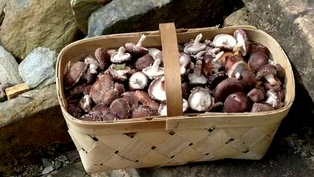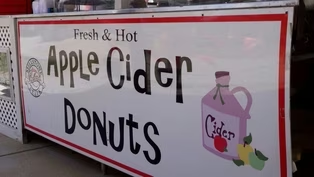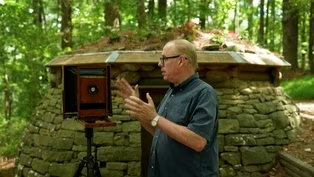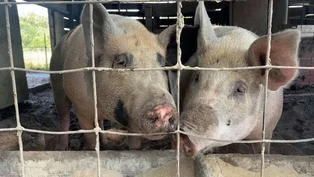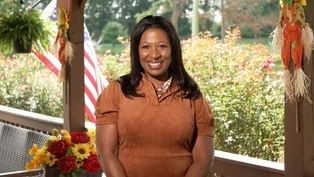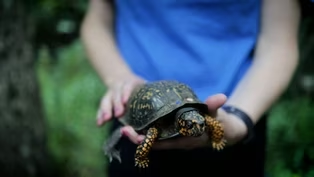
Local Beauty
Season 23 Episode 4 | 26m 46sVideo has Closed Captions
Explore NC destinations sure to please the eye.
Explore NC destinations sure to please the eye, including a nature center, an iconic site at the North Carolina Museum of Art in Raleigh and a family farm in Snow Hill.
Problems playing video? | Closed Captioning Feedback
Problems playing video? | Closed Captioning Feedback
North Carolina Weekend is a local public television program presented by PBS NC

Local Beauty
Season 23 Episode 4 | 26m 46sVideo has Closed Captions
Explore NC destinations sure to please the eye, including a nature center, an iconic site at the North Carolina Museum of Art in Raleigh and a family farm in Snow Hill.
Problems playing video? | Closed Captioning Feedback
How to Watch North Carolina Weekend
North Carolina Weekend is available to stream on pbs.org and the free PBS App, available on iPhone, Apple TV, Android TV, Android smartphones, Amazon Fire TV, Amazon Fire Tablet, Roku, Samsung Smart TV, and Vizio.
Providing Support for PBS.org
Learn Moreabout PBS online sponsorship- This program is made possible in part by generous support from Dogwood Health Trust, a private foundation based in Asheville, North Carolina, focused on dramatically improving the health and well-being of all people and communities in the 18 counties and the Qualla Boundary of Western North Carolina.
(piano intro) - Next on North Carolina Weekend, join us from Millstone Creek Orchards in Ramseur, as we celebrate local beauty.
We'll explore the Western North Carolina Nature Center.
Check out murals and food in Snow Hill and visit a cloud chamber in Raleigh.
Coming up next.
- Funding for North Carolina Weekend is provided in part by Visit NC, dedicated to highlighting our state's natural scenic beauty, unique history and diverse cultural attractions.
From the Blue Ridge and the Great Smoky Mountains across the Piedmont to 300 miles of Barrier Island beaches, you're invited to experience all the adventure and charm our state has to offer.
(upbeat music) ♪ - Welcome to North Carolina Weekend, everyone.
I'm Deborah Holt-Noel and this week we are celebrating local beauty from Millstone Creek Orchards in Ramseur.
This family owned orchard covers over 80 acres and it's full of fruit trees and flowers just ready for you to pick.
We'll learn more later in the show.
But first, let's head to the mountains where the Western North Carolina Nature Center suffered major damage due to Hurricane Helene, but they are back up and running and welcoming visitors.
- The WNC Nature Center is an accredited facility that displays animals, plants and artifacts that are native to the Southern Appalachian Mountains.
The history of the Nature Center started back in 1925 as the Asheville Zoo.
We did have things like lions throughout our history and we also up until the early 1980s had elephants here at the Nature Center.
The collection that we have in our mission shifted from one of a kind of a mishmash collection, a menagerie if you will, to focusing on animals and plants that live in the Southern Appalachian Mountains.
- So the animals here at the Western North Carolina Nature Center are mostly native to Western North Carolina.
We strive really hard to have a collection of animals that people can come here to see that they might also have in their backyard.
So it's really important for us to educate our guests about animals that they might live around like black bears.
Some animals like coyotes or foxes are a little more elusive and they don't get to see them as well.
- It's my first time here and I loved it.
It tells you about all of the mother nature.
It tells you about all of the animals.
I highly recommend if you want to know about nature and you really want to be educated on the wildlife, come here.
It is a beautiful, beautiful walk.
- It is very peaceful.
It's usually one of the first places that I take somebody who's visiting or new to town that I've met.
Like, hey, let's go to the nature center.
And it's really great with a membership, too, because you can get different levels and sometimes you can get like extra family members in and stuff like that.
You do feel like you get to connect with nature in a safe environment.
- Here we are coming up on a year since Helene in the mountains, and a lot of us are thinking about how far we've come as a community and also how far the nature center has come since that time.
The day after Helene was the first time that our staff was able to actually access the center.
We had some pretty significant tree damage.
We had some fences down.
We had some boardwalks that needed some serious repair.
Despite all the stuff that we had gone through, we were, we were safe.
Our animals were safe.
Our staff and our people were safe.
Within hours, we had zoos offering to send teams of people, supplies, come to us and help us with our repairs.
So that was, I think, the time when we realized when we got that outpouring that we were going to be OK.
- Hurricane Helene was a really difficult time.
And so when we were finally able to open, it was so wonderful to see the guests be able to come back because they had missed us.
We had missed them.
And it was really great to talk to all the guests and just ask how they were.
And we all just shared stories of getting through and dealing with it.
- The local community came around us after the devastating impact of Helene on this area.
One of the things I think that was most heartening for us was that literally by day two, our social media channels were flooded with people saying, are the animals OK?
Are you OK?
How did you fare?
And to know that we were top of mind really gave us it bolstered us to have the energy to continue going when things when things were difficult.
- We've renovated all our farm area so that our domestic animals have a much bigger space to roam.
And we've also added significant pollinator gardens to attract our local pollinators.
It was about six months later in March that we officially opened again to the public.
And so far this year, with the for the months we've been open, we've seen well over 100,000 people.
So people do love us and they're very quick to come and support us.
- It's just so amazing to see the support of the community and how much they really appreciate our facility and support us.
It's always positive.
They're always thanking us for taking care of the animals.
So it's just a really wonderful relationship that I think the Nature Center has with our guests.
- Well, our mindset moving forward is one of hope.
You know, in the future coming up, we have some great modifications that are going to be made here in the next five to 10 years.
So as people continue to return to this area every single time they come, they'll probably see something new.
So it's amazing how much and how this little gem that everybody calls that was known by the city of Asheville has spread its wings and become a favorite place for people that come from all over the country to stop when they visit the Asheville area.
- The Western North Carolina Nature Center is at 75 Gashes Creek Road in Asheville, and they're open daily from 10:30 a.m.
to 3:30 p.m.
They do not accept cash.
The best way to purchase tickets is online at wildwnc.org, or give them a call at 828-259-8080.
♪ - I'm here with Nick Mooney, who is the co-owner of Millstone Creek Orchards.
Nick, I am having a ball out here.
What do you think brings people out here to the orchard?
- Oh, they come out and get you pick fruit seasonally, everything from blueberries and blackberries all the way through peaches.
We're currently in apples.
Soon we'll have pumpkins and then Christmas trees.
So it's kind of throughout the season, pretty much starting in March.
- You also have sort of a little market in there.
- Well, the Apple Barn, yeah, that's where we that's our retail market.
And that particularly on a Saturday and Sunday, there's lines galore.
So we sell our fresh pressed apple cider.
We just actually did about 400 gallons this morning.
We also do our famous doughnuts, apple cider doughnuts, and they actually do those seasonally.
So they'll do some as blueberry during blueberry season, peaches, peach season.
And then now we're in apple season.
- Well, it sounds absolutely yummy.
- Oh, yes.
It's definitely probably not very healthy for you, but it sure tastes good.
- And I love seeing the stuff for the little kids.
Oh, yeah.
It's you know, when my father-in-law started the property, if you will, one of the things he thought was real important was education to these children.
So he always made it important that they learned where their food comes from.
And that's kind of the purpose of the tours.
- Tell me about the Cider House.
- Ah, the Cider House is our most recent addition.
So here in Ramseur, you know, we have a whole bunch of folks that visit us from far away.
And unfortunately, there wasn't a whole lot of places for them to eat.
So now we've opened up an establishment here that on Saturdays and Sundays, you can get chicken, hamburgers, French fries, flatbreads.
And we also have our own hard cider as well as craft beer from Four Saints.
So when you come out here, what people need to know about the hay rides and tickets and entry?
- In apple season, unfortunately, that's our busiest season, if you will.
So in order to kind of make a better guest experience, you have to kind of pre-register for your time slot to go pick apples.
So in other words, you decide you want to pick apples at 11 o'clock and the time slot's available.
When you show up on time, you get on that hay ride, you're out to the apples, you pick your apples by 11:20 to 11:25, you're finished and you can do what you decide you'd like to do the rest of the day.
Unfortunately, if we just opened it up to the to the masses, if you will, like we used to, then you could virtually stand in line waiting on a hay ride for three or four hours.
The guest experience here is the most important thing.
And my wife, she's the genius here.
You know, she wants you to leave here and feel as though you're part of our family.
- Thanks so much, Nick.
I look forward to enjoying the rest of the orchard.
- My pleasure.
Please come back soon.
- Millstone Creek Orchards is at 506 Parks Crossroads Church Road in Ramseur, and they're open daily.
To find out more, give them a call at 336-824-5263 or go online to millstonecreekorchards.com.
- Mushrooms can be a form of local beauty and there's a growing fan club of people who want to learn as much as possible about their healing properties, how they taste and how they're grown.
So producer Teresa Litschke journeyed to Mills River and met with a renowned mushroom expert at Deep Woods Mushrooms.
♪ Deep Woods Mushrooms.
♪ - Yeah, that's my shaggy stock bolete.
In nature, they grow about this high.
But if you ever eat one, you might build a 28 foot tall statue to one as well because they are delicious.
The stem has the texture of asparagus and a lemony kick that will knock your socks off.
- It's safe to say Greg likes mushrooms.
- They're fascinating.
Mushrooms like people are weird, kind of like me.
- His interest has earned him many titles like the Mushroom Man and the Fun Guy.
- Or I would like to be called Johnny Mushroom Spore because I'm the local enthusiast sharing my knowledge of mushrooms so you can be a Johnny Mushroom Spore too.
- He's quick to dispel any myths about mushrooms.
- People think that mushrooms are grown in manure in the caves in Pennsylvania.
(buzzer) - And whether or not you should eat them raw.
- All mushrooms should be cooked.
They contain a gas not unlike rocket fuel in various levels that need to be cooked off.
- But when cooked, Greg believes mushrooms are hard to beat.
- They're the superfood.
They're full of proteins and have amino acids and they're just a healthy, healthy food product.
And I believe everybody should have a rick logs in their backyard to grow some of the healthiest foods right there.
- He sure does.
It's his business.
Deep Woods Mushrooms featuring foraged and cultivated mushrooms grown in wood.
The latter is for mushroom logs, a process that's been around for centuries.
A hole is drilled into a log.
Mushroom spawn is inoculated into the hole and plugged with wax.
Eight months to one year later, mushrooms start popping out all over.
Greg was introduced to the concept back in 1999.
- And it kind of mushroomed into a business.
(laughs) Pun intended.
- Greg sells his cultivated and wild mushrooms at local farmers markets like Oyster, Turkey Tail, Chaga, Reishi and Shiitake.
- Shiitake is by far my largest crop.
It's not easy, but it's the easiest of log grown mushrooms to grow.
And knowing where your mushrooms come from is very important.
- Which is why Deep Woods Mushrooms also sells the kits and spawn for you to grow your own.
- And it includes the drill bit, the wax, the instructions, the tags, everything you need except the log to grow log grown Shiitake mushrooms.
- Plus, Greg offers classes about inoculating logs as well as farm tours.
- And I show people which ones are easiest to grow versus ones you want to hunt.
The mushroom hunt classes, I teach people the ones in our area that grow abundantly, that have few lookalikes.
And that's your starting point to get involved in foraging.
- Very interesting.
Super cool.
We've done it some other places and we wanted to kind of kind of learn more about them.
- Customers especially enjoy hearing about mushrooms' medicinal benefits.
- Drank Chaga for three days and all their shingles symptoms subsided.
- Really?
- I think a lot of what we like about it is the natural healing part of it.
You know, so we're pleased to learn about it.
- I have been visited by numerous oncologists who know the value of mushroom.
- And it's that value for all things mushroom.
This fun guy hopes to offer each of his guests no matter their age.
- So from from four year old to 80 years old, it's a good knowledge base.
- He's just been very good about showing us the different types of mushrooms, a lot of the different uses, already learned some stuff that I didn't know.
- And I tell people you're going to get the world of mushrooms, according to me, a 20 year grower and forager.
And I'm not selling commercially, so I'm sharing my knowledge.
So hopefully you can understand and do it yourself.
♪ - You can find Deep Woods Mushrooms at 70 Deep Woods Road in Mills River, and they're open every day except Sunday.
To learn more, give them a call at 828-243-3589 or go online to deepwoodsmushrooms.net.
- When producer Seraphim Smith was painting a mural in Snow Hill, a local farmer told him about a new market just down the road.
Let's see how Nooherooka Sustainable Farms is producing humanely raised deliciousness.
♪ - I'm working on a new mural that features the Betsy Ross stars and stripes alongside the flag of Greene County.
I designed it to enhance the new Charters of Freedom Courtyard, which contains bronze replicas of our nation's founding documents.
About 1,500 residents live in Snow Hill.
His name was derived from the white sandy banks of nearby Contentnea Creek.
Let's take a field trip and meet some of my friends down at the Nooherooka Natural Farm Market.
- Well, first of all, let me say you're in Greene County and Greene County is the home of Nooherooka Natural pasture raised beef and pork products.
We say our animals don't do drugs because we don't use hormone steroids, antibiotics or any of the additives that most beef, particularly pork products contain.
- From nuts to honey, they've got ham, jam and jelly.
- We like to feature our local craftsmen and farmers.
- We have a little bitty farm right down the road here in Arba.
We make goat's milk soap using our own goat's milk and beef tallow sourced from Nooherooka right here in Snow Hill.
- The name Nooherooka originates from the once nearby Native American Fort Nooherooka.
This sculpture is in remembrance of the bloody conclusion of the Pescara War nearly 300 years ago.
The animals of Nooherooka eat an all natural diet, including hay grown right on the farm.
- I'm Andrew Kearney and Mary Betty is my mom.
We started this, she and my dad and I, 20 years ago.
Do the hay, try to keep the cows fed and whatever else needs to be done.
- Back at the ranch, I'm excited to find out more about the B.W.
Best Country Inn.
- The Benjamin Best House, the original starter house, was built in 1823.
It's a historic property on the National Registry.
We did a lot of renovation.
We moved everything that's here on this lot.
This was a diversification to tobacco.
And we opened the first B&B in Greene County.
We offer farm tours while you're here and we like to feature the way we grow our animals, which is very healthy.
- If you like to party like an animal, you're in luck.
The barn easily accommodates parties for up to 400 people.
- We do offer some activities here on the farm from time to time.
And one of those things that you can enjoy right in the B&B is Miss Lillie Hardy.
We love having Miss Lillie here.
She is a character within herself.
And she's most interesting.
She really is the biscuit maker.
And everybody gets to gather around and have their own pan of biscuits and they compete with each other.
And we carry them into our formal dining room.
And we have a really good time with homemade butter, molasses, honey, homemade jams and jellies.
- Pass me the fig preserves, if you would, please.
Sorry, cows.
We ate all of Miss Lillie's hot buttermilk biscuits.
So come visit Snow Hill.
I bet you'll be udderly amoosed the entire weekend.
♪ - The Benjamin Best Country Inn at Nooherooka Natural is at 2029 Newborn Church Road in Snow Hill.
To plan your visit, give them a call at 252-714-2650.
The Farm Market is at 1151 Highway 13 in Snow Hill.
And it's open Wednesday through Saturday.
To learn more, visit Nooherooka.com.
- Art and beauty mingle at the park by the North Carolina Museum of Art in Raleigh.
Producer Sadie Maddock takes time to stroll through the woods and discover the magic of a small building that hides a whole new view of the world.
- There are no two moments in this space that are the same.
The trees are constantly growing or losing leaves or dropping branches.
The sun is constantly moving.
It's different from season to season, but also second to second.
- There's always wonder in nature.
I can get lost in seeing a plant that I love flowering.
And there's always something new that just, you know, is astounding sometimes.
- When you hang two paintings next to each other, they have a conversation that they wouldn't have with another work of art.
And I think the same thing happens outside.
But instead of it being the interaction with other works of art, it's the interaction with the landscape and how the landscape changes.
- Everybody loves a park.
So it's just easy to engage with people that way.
- They don't necessarily come here as an art destination, but that's why I like having art out here.
It's this unexpected encounter that you get to have.
- Even though I've been to the North Carolina Museum of Art more times than I can count, I'd never been to this particular exhibit.
So I saw the cloud chamber on the map and I just knew that I wanted to check it out.
You come in, you shut the door and it feels like nearly complete darkness.
- Every time I go into the cloud chamber, I'm surprised.
To me, it's magic.
It was commissioned in 2003, the centennial of the Wright Brothers' first flight at Kitty Hawk.
I started thinking about Chris Drury's work because it's all about the sky.
- The trees on the wall are upside down and on the floor, they're reaching into the sky.
- Upside down?
No, what you're seeing is just the way it should be on the back of what is called a camera obscura.
Or you might just call it a pinhole camera.
- Chris Drury's cloud chamber operates as a room-sized pinhole camera.
And instead of having a pinhole, in the center of the roof is a metal plate and it has a hole in the middle of the plate that's about the size of a quarter.
And when the light from outside goes through the hole, it projects an image of everything above the chamber onto the walls and the floor.
- What started as these vague shapes or shadows are beginning to take form.
- It takes probably 15 or 20 minutes for your for your eyes to fully adapt to the dark.
Then when the image resolves and your eyes adjust, it's pretty, it's pretty amazing.
I was here and documented it when it was being built.
Chris Drury had a mason trimming the stones on site by hand, and then I also got to see this conservation project.
They basically reconstructed the roof with with Chris's guidance.
When I had to photograph the interior of this, I definitely had to use a tripod and it's a very long exposure, like photographing water with a time exposure that like the the leaves become just sort of like an undulating wave rather than discernible individual objects.
- I've been photographing the Eno and Orange and Durham counties for almost 15 years.
This camera is 135 years old.
It's a joy to work with a camera like this and to take the results into a dark room and make a photograph.
The word camera obscura means dark room in Latin.
The 19th century view camera is just another version of this.
It's a very simple machine.
It just has a volume, a room and an opening and a place to view it.
What's great about the cloud chambers is that you get to stand inside the camera.
You know, it's not just looking through the camera, it's being inside the camera, which is really very, very dreamlike.
- It completely shifts your perspective of the world.
Instead of looking up at the sky, you're looking down at it from above and it gives you a completely different vantage point on the world.
- And then you step outside again and it's kind of like you forget like you're in another world for a moment.
- Even as your eyes are adjusting, the world is changing.
- The cloud chamber for the trees and sky is on the campus of the North Carolina Museum of Art at 2110 Blue Ridge Road in Raleigh.
To learn more, go to ncartmuseum.org.
- This is a muscadine known as the North Carolina grape, just one of the many fruits that you can enjoy while you're here at Millstone Creek Orchards in Ramseur.
We have had such a great time out here.
And if you miss anything in tonight's show, remember, you can always watch us again online at pbsnc.org or you can find any of our stories on our YouTube channel.
Have a great North Carolina weekend, everyone.
(upbeat music) ♪ - Funding for North Carolina Weekend is provided in part by Visit NC, dedicated to highlighting our state's natural scenic beauty, unique history, and diverse cultural attractions.
From the Blue Ridge and the Great Smoky Mountains across the Piedmont to 300 miles of Barrier Island beaches, you're invited to experience all the adventure and charm our state has to offer.
- This program is made possible in part by generous support from Dogwood Health Trust, a private foundation based in Asheville, North Carolina, focused on dramatically improving the health and well-being of all people and communities in the 18 counties and the Qualla Boundary of Western North Carolina.
Video has Closed Captions
Clip: S23 Ep4 | 4m 41s | Learn all about mushrooms, from inoculation to foraging, at Deep Woods Mushrooms in Mills River. (4m 41s)
Video has Closed Captions
Clip: S23 Ep4 | 3m 2s | Pick apples and enjoy the activities at an 84-acre farm in Ramseur. (3m 2s)
Video has Closed Captions
Clip: S23 Ep4 | 5m 23s | Step into the Cloud Chamber, outside the North Carolina Museum of Art, for a new view of the world. (5m 23s)
Video has Closed Captions
Clip: S23 Ep4 | 4m 40s | Sample farm-fresh flavors at the Nooherooka Farm Market in rural Snow Hill, NC. (4m 40s)
Preview: S23 Ep4 | 23s | Explore NC destinations sure to please the eye. (23s)
Video has Closed Captions
Clip: S23 Ep4 | 4m 58s | The WNC Nature Center connects people with the plants and animals of the Appalachian Mountains. (4m 58s)
Providing Support for PBS.org
Learn Moreabout PBS online sponsorshipSupport for PBS provided by:
North Carolina Weekend is a local public television program presented by PBS NC
